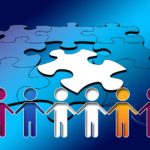It’s been a tough year.
We’ve had to confront both an indiscriminate killer in the form of a virus as well as discriminant ones, it seems, in the form of the American police force.
The killing of George Floyd (and many others like him) brought to the fore conversations that I hadn’t heard in a long time. I was reminded that, just because we don’t see racism – speaking as a white, middle-class woman – it doesn’t mean it doesn’t exist. The Black Lives Matter movement reminded us to think of those who are less privileged than us.
So I want to say a few words about privilege.
You see, I know about privilege – other people’s privilege. Men’s privilege over women. Yes, I have been in several conversations where the man conversing with me and my friend/husband/male colleague only acknowledged the other male in the conversation, not making any eye contact with me. I’ve also been ogled, propositioned and humiliated by men for being a woman. I have been passed up for promotions and have been criticised for doing what men do to get ahead because that’s not what women do. I have frequently experienced the impediment of being of the wrong gender. Yet none of that prepared me to see myself as privileged over others.
Don’t get me wrong, I get the privilege bestowed on the rich over the poor, the smart over the not so smart, the native speakers over accented narrators. But during the conversations that started bubbling up as a result of the Black Lives Matter movement, I learned that I really didn’t understand privilege at all. White privilege that is.
It’s true what they say. Privilege is invisible to those who have it. You just take everything for granted. When you’re pretty and everyone smiles at you, you think everyone is nice. When you’re straight and you unassumingly mention the opposite gender of a person you’re speaking to, you don’t see them squirming inside, trying to hide the fact that their partner is, in fact, of the same sex. When you’re white in America, you see the police as your protector whereas as a black person, you might turn the corner to get away even though you’ve done nothing wrong. As a white person, you don’t see that.
Malcolm Gladwell made the point in his latest book Talking To Strangers that we all apply a double standard when it comes to understanding what’s happening to us and understanding what’s happening to others. We think that when someone says something shocking about a black person, they are racist – not like us. We would never do that. And yet I know that, if I pushed my non-white friends, I’m sure they would tell me of instances when I said things to them that made them cringe inside. They spared me the embarrassment; they knew I didn’t mean it.
In a recent roundtable discussion that I moderated, one of the speakers made the point that it is up to each one of us to educate ourselves on what type of behaviour or language might amount to a microaggression. It should not be up to the person experiencing the blow to educate us. So I picked up that call to action.
Enough with the blind spots. Let’s acknowledge the facts: men have it easier in life than women; white people have it easier in life than non-whites; heterosexuals have a smoother ride than LGBTQ+ and so on and so on. Let’s acknowledge it and agree to educate ourselves. Let’s stop and think before we speak. Let’s not begrudge people opportunities where none existed for centuries.
Our eyes may not be opened instantly, but we can try to see what previously escaped us if we keep trying.
Will you try?
For a great explanation of White Privilege, watch John Amaechi’s Bitesize on BBC.



 Emma Watson addressed the United Nations in 2014, urging men to join the feminist movement; Barak Obama supported the cause when he proclaimed he was a feminist. Many companies recognise “men as allies” as a critical component of their diversity and inclusion efforts. And yet, support by men for gender equality is waning. Particularly in companies.
Emma Watson addressed the United Nations in 2014, urging men to join the feminist movement; Barak Obama supported the cause when he proclaimed he was a feminist. Many companies recognise “men as allies” as a critical component of their diversity and inclusion efforts. And yet, support by men for gender equality is waning. Particularly in companies. The privilege of invisibility
The privilege of invisibility Societal norms and expectations
Societal norms and expectations So how do we engage men?
So how do we engage men?